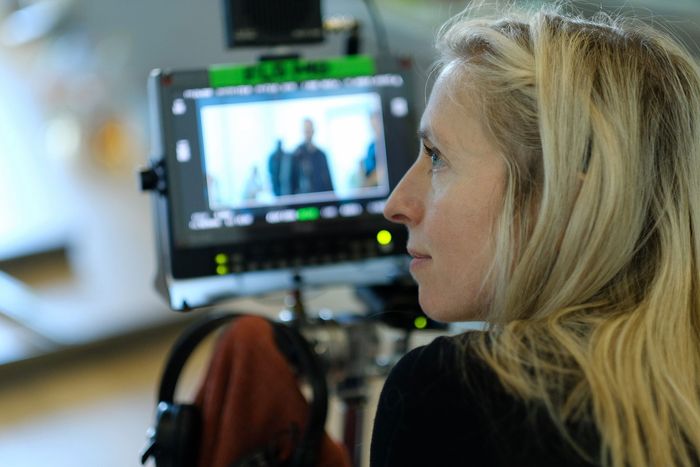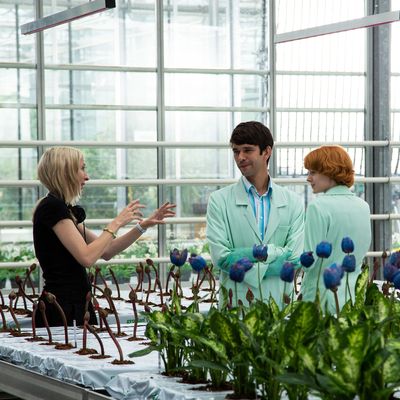
One of the first things you learn about plants is that they can only thrive in certain climates. As an interview subject, the Austrian filmmaker Jessica Hausner is the same way. On a recent meeting at the Brooklyn Botanic Garden, any sort of open-air conversation is immediately off the table: Her glen-plaid coat and silk headscarf are no match for the brisk November breeze. A sortie into a greenhouse reveals it’s much too hot and humid to think straight in. Finally, we are drawn inexorably toward a basement area that is completely devoid of plants, and completely full of screaming children. (The garden is free on Fridays, a boon for journalists and schoolteachers alike.) “I must apologize, I’m like an old lady today,” Hausner says. She is aspirational in her directness. In 75 minutes of conversation, this is her only moment of self-deprecation.
If you’re wondering why this interview is taking place at a botanical garden, well, so is Hausner. The idea was to tie into her new film Little Joe, a botanical thriller about a scientist who genetically engineers a flower that heightens oxytocin production in the brain, with chilling results. Except as it turns out, the director has no strong opinions about plant life. “Plants are like pets, you feed them and they are nice to you,” she says. She does not care for pets, either.
Helpfully, in Little Joe the flower is just a MacGuffin, an excuse to explore ideas Hausner is really interested in, like free will and why it doesn’t exist. The movie is like Invasion of the Body Snatchers, if the body snatchers turned their victims into happier, healthier versions of themselves. Most horror films allow viewers to shudder at fantasies of self-debasement; Little Joe may be the first to do the same thing for self-actualization. (At Cannes, one critic dubbed it “anti-horror.”) Some reviewers have taken the film as a Black Mirror–style polemic against antidepressants, but Hausner doesn’t see it this way. “It’s saying, even if we all have been changed, it’s not so bad,” she shrugs. There’s no point in worrying about unnatural influences crowding out authentic emotions, because there’s no such thing as authentic emotions in the first place. In her movies, nothing we do ever comes purely from ourselves.
As an American moviegoer, there is little shame in not having seen a Jessica Hausner film before. Though her previous efforts have premiered at prestigious European festivals like Venice and Cannes, Little Joe is her first English-language project, and the first to get a proper U.S. release. (Her previous film, 2014’s Amour Fou, played three theaters over here, grossing slightly more than $13,000.) Her work is not very popular at home either. “Austrians are educated to love opera and theater,” she says, not arthouse cinema. Her sense of humor, however, she pegs as very Austrian: “It’s dark and dry. A lot about dying and death.”
There’s a heightened, distant quality to Hausner’s movies. She compares them to naïve art: The perspective is so unnatural that the abstract symbolism of the stories is even more apparent. Her frames often cut actors off at odd angles, and performers speak in spare, weighty tones. She matches this uncanny vibe with color schemes that would make Wes Anderson drool. Her recent work has been a festival of drab pinks and cheeky greens, and she has a penchant for bright red props that pop onscreen. Hausner’s sister Tanja does her costumes; sometimes, Jessica says, “We giggle at the humor of it.” The highly unflattering look the heroine sports in Little Joe came out of a photo Tanja spotted in an issue of Vogue, of a model with a short ginger haircut, wearing a pink blouse and a beige trench coat. “She looked very 1970s,” Hausner recalls, “But it was also clear that it was from nowadays.” She wants her characters to feel slightly removed from the specifics of time and place. “I’m trying to make films that feel more like fairy tales,” she says.
To Hausner, naturalism is the province of narratives where characters have concrete desires. That’s never been her interest. “I don’t show the part of life where we can decide what we want,” she says. “I show the other part, where we are influenced and manipulated by the society we live in.” She is a master of observing the currents of unconscious social pressure, a concept you’d really think there would be a German word for, though it does not immediately spring to mind.
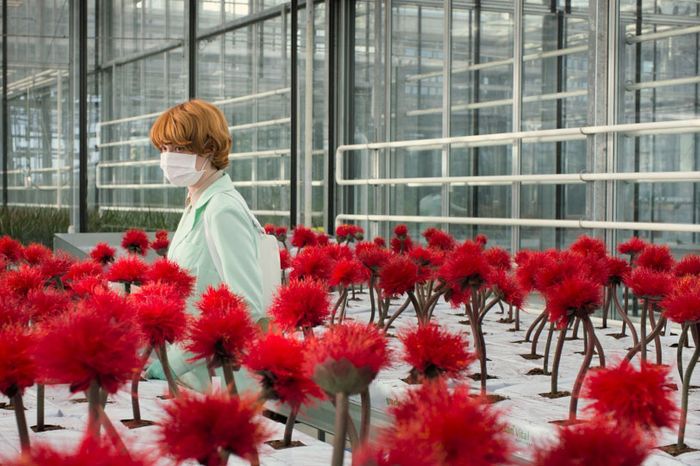
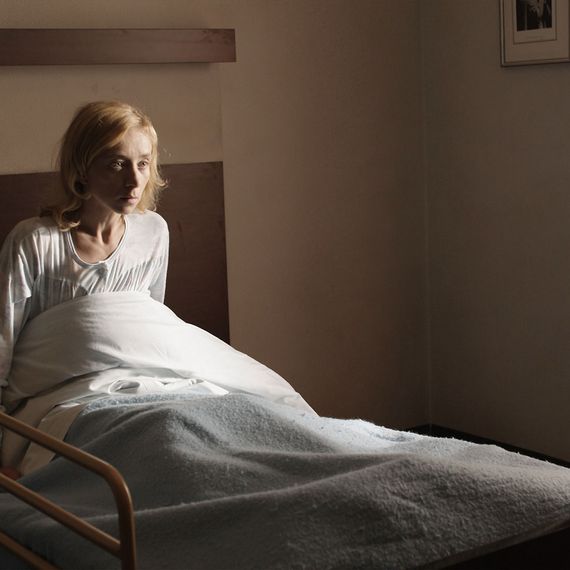
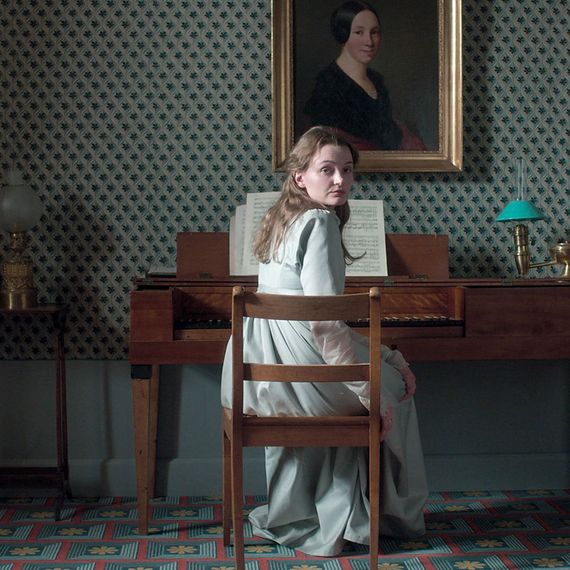
My favorite Hausner film is 2009’s Lourdes, which follows Christine (Sylvie Testud), a woman with cerebral palsy who visits the titular shrine, mostly as a way to get out of the house. Halfway through, she appears to have been suddenly cured, which necessitates a doctor’s visit to decide whether she’s been the subject of a religious miracle or a medical one. Once the hand of God has been confirmed, Christine’s fellow pilgrims have trouble hiding their dismay: Why her, and not someone more pious? Then, at a celebratory dance, she tumbles to the ground. Aha! No miracle after all! Christine gets back up, but the mood in the room has irrevocably shifted. Chastened, she sits back down in her wheelchair.
And then there’s Amour Fou, a darkly comic retelling of the famous murder-suicide of Romantic poet Heinrich von Kleist (Christian Friedel) and his companion Henriette Vogel (Birte Schnöink). In Hausner’s version, the pair are not star-crossed lovers. Heinrich is an obnoxious egoist, but Henriette nevertheless finds herself drawn to his scheme as an escape from her stultifying domestic life, an escape her oblivious husband passively condones. Here Henriette’s fate is less a grand gesture than a deadly case of inertia. “She goes along to wait for the right moment to say no,” Hausner says. “But she misses the moment.”
In Little Joe, Alice (Emily Beecham, Cannes’ Best Actress winner) is similarly on her own. By the end of the film, her fears about the flower’s harmful effects are falling on deaf ears; her coworkers and son, having already been exposed, wish she would just relax. It is probably not a coincidence that Hausner’s protagonists, all of whom are met with apathy, disbelief, and mistrust from those around them, are also all women. There’s little sisterly solidarity to be found in her work. “All my films are focused on being alone,” she says. This is a separate quality from loneliness. “To be alone is not judging, it’s a basic condition. You still can be happy or have friends, but you’re alone. If you’re lonely, you pity yourself. You think, Oh, I’m so lonely. That’s the difference.”
On set, Hausner instructs her actors not to try to find the truth in any moment, but rather the lie. In Little Joe, Ben Whishaw’s character unloads a delicious bit of gossip about a co-worker — she’s got all sorts of issues, she attempted suicide, she’s hasn’t been acting like herself. But of course, he adds, he would never judge her. “Ben was very much in favor of working on those double-sided sentences,” Hausner recalls. “If you understand that everyone is pretending anyway, then it doesn’t make sense to ask yourself if the plant changes your true feelings. Because, where are those true feelings?” She sees human interaction as an unending series of lies, but this, too, she’s okay with. “If you say the truth all the time, it could be horrible. In a relationship, you have to lie. Otherwise, you cannot stay with a person for more than half a year.”
Hausner says this all very matter-of-factly, and her cinematic gaze operates at a similarly nonjudgmental remove. There’s a distinct amorality to her plots; if God exists, as He might in Lourdes, His ways are so baffling as to defy further study. “The films all talk about our wish that there would be some God or some happiness or some love. That is why we invent those words,” she says. “Of course we would like to have romantic love, and have everything makes sense, and we would wish to have a happy life. But what is a happy life? Happiness is on my iPhone, a picture of the beach. I don’t know what happiness is. If you take a closer look, it vanishes.” She hesitates. “Maybe I exaggerate.”
By now we’ve been sitting for a while, and before we go get coffee, I suggest we take another shot at visiting the conservatory. Hausner accedes to my own social pressure: “I don’t want to spoil your idea.” We venture upstairs and find ourselves in a room full of immaculate bonsai trees. “I like Japanese bonsai,” she says cheerfully. But after discussing her philosophy for the better part of an hour, I have to wonder: Is that just something she’s saying so we’ll have some plant talk? As it happens, Hausner is telling the truth. She loves a lot of aspects of Japanese culture: The Little Joe score, by Teiji Ito and Markus Binder, employs taiko drums to haunting effect, and she’s long been enthralled by kabuki theater. “It’s a friendly neighbor of the way I direct,” she says — tight and controlled; formal, but a little exaggerated. For her next project, she plans on putting the actors in “super unnatural” makeup, the same way Kurosawa did. “The more films I make,” she says, “the more stylized everything gets.”



